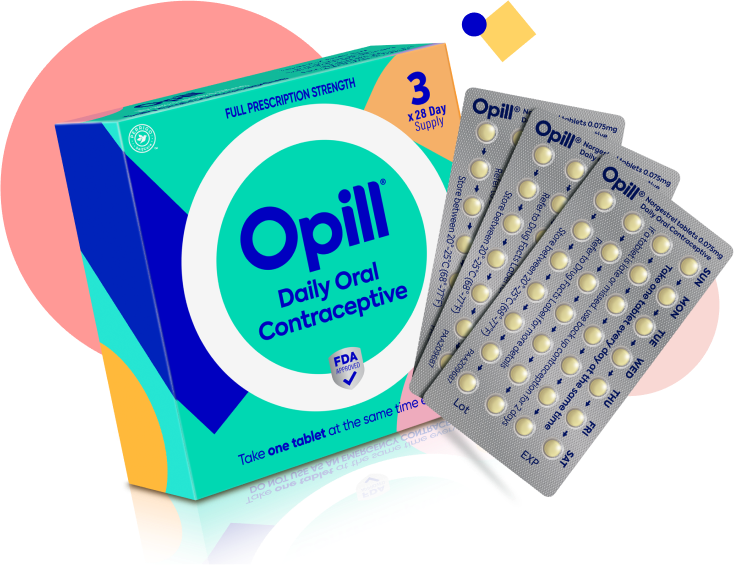Whether you are considering a progestin-only pill (POP) like Opill® or a combined oral contraceptive (COC), we have helpful information to guide you in choosing the best birth control pill for your needs.
Some of the most common questions we've heard are about birth control pills in general and how they might manage premenstrual syndrome (PMS), treat acne or regulate menstrual cycles. Before we delve into the details about progestin-only pills and combined oral contraceptives, let's first examine these commonly searched for topics.
Key factors when considering birth control pill options include:
-
Premenstrual syndrome (PMS)
: Do you notice any changes in your body before your period? It's common to experience symptoms like headaches, bloating and weight gain during this time. This is known as premenstrual syndrome.1 If you're looking for relief from PMS symptoms, there are a few options to consider. According to The American College of Obstetricians and Gynecologists, “Drugs that may prevent ovulation, such as hormonal birth control pills, may lessen physical symptoms.”1
Another option is using over-the-counter medications that contain diuretics or pain relievers, as they may also provide some relief.2
-
Treatment options for acne
: There are a variety of options available to treat acne, so if you're looking to effectively manage breakouts, you have choices. These options include prescription medications, over-the-counter remedies and certain combined oral contraceptive products that have been approved by the FDA as acne treatments.3
-
Regulating menstrual cycles
: When taking combined oral contraceptives, you can expect to have a scheduled period during the time you take the placebo pills in the pack. This can be helpful for those who prefer to have a clear understanding of when their period will occur.4 For progestin-only contraceptives with no placebo pills, the pattern of bleeding can vary among individuals. Some people may still have regular periods, similar to their natural cycle, while others may experience lighter or more frequent bleeding.5

Comparing oral contraceptive options
When taken as directed, both progestin-only pills and combined oral contraceptives are effective at preventing pregnancy, but they have some differences you should know about. Let's dive into each contraceptive option in more detail.
Progestin-only birth control pills (POPs)
Progestin-only pills (POPs), sometimes referred to as “mini pills,” contain only one hormone and are estrogen-free. This can be beneficial if you experience side effects from estrogen or cannot take estrogen. POPs work by thickening the cervical mucus, which helps to block sperm from reaching the egg. They also prevent your ovaries from releasing eggs in some cycles.6
Opill® is a progestin-only, daily birth control pill you can purchase over the counter without needing a doctor's prescription. This is a convenient option for people who might be short on time or unable to afford a doctor’s visit to obtain a prescription.
Here are a few more important things to keep in mind when taking POPs:
-
Start or stop the pill at any point in your menstrual cycle
: You have the flexibility to choose when you want to start or stop taking POP birth control pills. No matter what day of your menstrual cycle it is, you can begin taking the pill whenever you feel ready. And if you ever decide to stop taking them, you have the freedom to do so at any point during your cycle.6
-
Safe for breastfeeding at all stages
: Parents, here's some good news! If you are breastfeeding, you can safely take POPs at any point while nursing your baby. While a small amount of progestin may pass into the breast milk, no negative effects on breastfeeding or your baby’s health have been shown.6
-
A safe choice for individuals who can't use estrogen
: POPs are a safe and effective choice for people who are unable to use estrogen due to conditions such as migraine with aura, high blood pressure and smokers over 35 years. Unlike combined birth control pills that have both progestin and estrogen, progestin-only pills do not increase your risk of blood clots.7
Combination birth control pills (estrogen-progestin pills)
Combined oral contraceptives (COCs) contain both estrogen and progestin, two hormones that work together to prevent pregnancy. They work by stopping your ovaries from releasing eggs and thickening your cervical mucus to create a barrier against sperm.
Here’s what you should know about taking COCs:
-
The five- and seven-day rule for effective COC contraceptive protection
: The timing of when you start taking COCs to prevent pregnancy is very important. Ideally, you should begin taking the pill within the first five days of your period. However, if you start on any other day of the month, you’ll need to take the pill continuously for seven days before it becomes effective in preventing pregnancy.
During these seven days, use a backup barrier method like condoms for protection.7
-
Increased risk of developing blood clots
: Taking birth control pills that contain estrogen may slightly increase the chances of developing blood clots for everyone. For most healthy individuals, this small increase is still considered safe. However, if you have a condition that puts you at increased risk for blood clots or stroke, such as high blood pressure, migraine with aura, a prior blood clot or stroke, or are a smoker over the age of 35, taking birth control pills with estrogen can further increase these risks. To stay safe, it's best to avoid using birth control pills that contain estrogen.8
-
COC use during the postpartum period
: After giving birth, there is a higher chance of getting blood clots called deep vein thrombosis (DVT).7 To stay safe, speak with your doctor about alternative options.
Additionally, breastfeeding individuals should avoid using COCs during the first four weeks (or within 30 days) after giving birth. According to the Center for Disease Control and Prevention (CDC), breastfeeding people should generally not use COCs during the fourth week postpartum because of concerns about potential effects on milk supply.7 During this period, POPs are considered a safe and effective option.

Which birth control pill is right for you?
The answer depends on your unique needs and preferences. Keep in mind that neither POPs nor COCs protect against sexually transmitted diseases (STDs). Additionally, both types of birth control pills are not recommended if you have or have ever had breast cancer.
Learn more about Opill® and explore FAQs to see if it may be the best option for you.
[1] “FAQs, Premenstrual Syndrome (PMS),” The American College of Obstetricians and Gynecologists, accessed September 18, 2023, https://www.acog.org/womens-health/faqs/premenstrual-syndrome
[2] “Over-the-Counter (OTC) Monograph M027: Orally Administered Menstrual Drug Products for Overthe- Counter Human Use,” U.S. Food and Drug Administration, accessed November 14, 2023. https://www.accessdata.fda.gov/drugsatfda_docs/omuf/OTC%20Monograph_M027-Orally%20Administered%20Menstural%20Drug%20Products%20for%20OTC%20Human%20Use%2012.16.2021.pdf
[3] Frances E. Casey, MD, MPH, Contemporary OB/GYN Journal, Vol. 68, No. 1, January 1, 2023. “Contraception and its impact on acne.” Accessed 11/14/23. https://www.contemporaryobgyn.net/view/contraception-acne
[4] MacGregor, E Anne, and Guillebaud, John. BMJ sexual & reproductive health, June 26, 2018. “The 7-day contraceptive hormone-free interval should be consigned to history.” Accessed November 20, 2023. https://srh.bmj.com/content/familyplanning/44/3/214.full.pdf
[5] “Progestin-Only Hormonal Birth Control: Pill and Injection,” The American College of Obstetricians and Gynecologists, accessed November 16, 2023. https://www.acog.org/womens-health/faqs/Progestin-Only-Hormonal-Birth-Control-Pill-and-Injection
[6] Opill® over-the-counter [Consumer Information Leaflet]. Dublin, Ireland: Perrigo Co.; 2023.
[7] Centers for Disease Control and Prevention, Morbidity and Mortality Weekly Report, Vol. 65, No. 3, July 29, 2016. “U.S. Medical Eligibility Criteria for Contraceptive Use.” Accessed October 13, 2023. https://www.cdc.gov/mmwr/volumes/65/rr/pdfs/rr6503.pdf
[8] “Understanding Blood Clots,” Centers for Disease Control and Prevention, accessed October 10, 2023, https://www.cdc.gov/ncbddd/dvt/understanding-blood-clots-infographic.html


